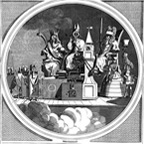ABSTRACT
In the relationship between social networks and democracy it is necessary to consider a fundamental mediator such as the technological companies that manage the networks. That mediator has been hidden for a long time, to the point that it has been usual to think of social networks as an instrument of political communication without mediators (as opposed to traditional media), which is obviously not true. Social networks are not a natural phenomenon that has appeared in social and political processes spontaneously. They are the result of business options that have set up a business model based on attracting the public’s attention to optimize advertising performance through the continuous use of networks. This business model is causing significant problems in the processes of political communication because it promotes the fragmentation of public sphere and its radicalization in order to increase the use of networks and thus obtain more benefits. To this economic purpose we must add the advantages for these companies of generating instability to weaken democratic institutions what hinder the control that these institutions should perform over the technology companies.
There are many areas in which social networks are generating dysfunctions from a constitutional and democratic point of view. From fundamental rights to electoral processes, through the configuration of the constitutional order, in a context in which the conditions of space and time have been transformed as a result of globalization and technological development. New cultural patterns and new paradigms are being generated and their impact on constitutionalism is very broad. Some of the changes that social networks have brought can be structural and will be predictably maintained in the future. Others, however, can be considered directly linked to the interests of technology companies and should be subject to revision to prevent a democratic involution. The intervention of public, state and supranational authorities is more and more necessary to control these companies. The measures that can be taken are very diverse. From strengthening the protection of fundamental rights to promoting the digital education of citizens, as well as actions aimed at preventing technology companies from consolidating monopoly positions or fiscal and sanctioning measures, etc. Particular importance has the regulation of electoral processes to avoid interferences through fake news and targeted subliminal propaganda. The horizon is moving, in any case, as technological development advances and these companies design new strategies. Therefore, it is necessary to bear in mind that the risks are not only those we know today but that we must have a vigilant attitude to impede generating new dysfunctional effects in the future.
Parole chiave: Social network, società tecnologiche, Fake News, democrazia.
Keywords: Social Network, Technological Companies, Fake News, Democracy.
Scarica il testo in formato PDF
Sommario: Introduzione. 1.- Il contesto della globalizzazione. 1.1- Accelerazione del tempo e estensione dello spazio pubblico. 1.2.- Attori globali e Stato. 2.- Trasformazione dei modelli culturali e cambio di paradigma. 3.- Costituzione, democrazia e social network. 3.1- Costituzione e social network. 3.2- Processi democratici e social network. 4.- Le società tecnologiche e le reti. Aspetti problematici. 4.1- Incidenza sui diritti fondamentali. 4.2- Tendenza al monopolio e impatto sulla concorrenza. 4.3- La pressione sui mezzi di comunicazione tradizionali. 5.- I processi comunicativi e di costruzione dello spazio pubblico. 5.1- Il precedente substrato, globalizzazione e crisi economica. 5.2- La frammentazione e radicalizzazione dello spazio pubblico. 6.- I processi elettorali. 6.1- Notizie false e disinformazione. 6.2- Interventi di attori esterni e di gruppi organizzati. 6.3- Profili individuali e propaganda subliminale. 7.- Possibile aree di azione. 7.1- Diritti fondamentali. 7.2- Concorrenza, pubblicità e mezzi di comunicazione. 7.3- Processi elettorali. 7.4- Misure fiscali. 7.5- Sanzioni. Conclusioni/Sintesi. Parole chiave. Abstract. Keywords.






